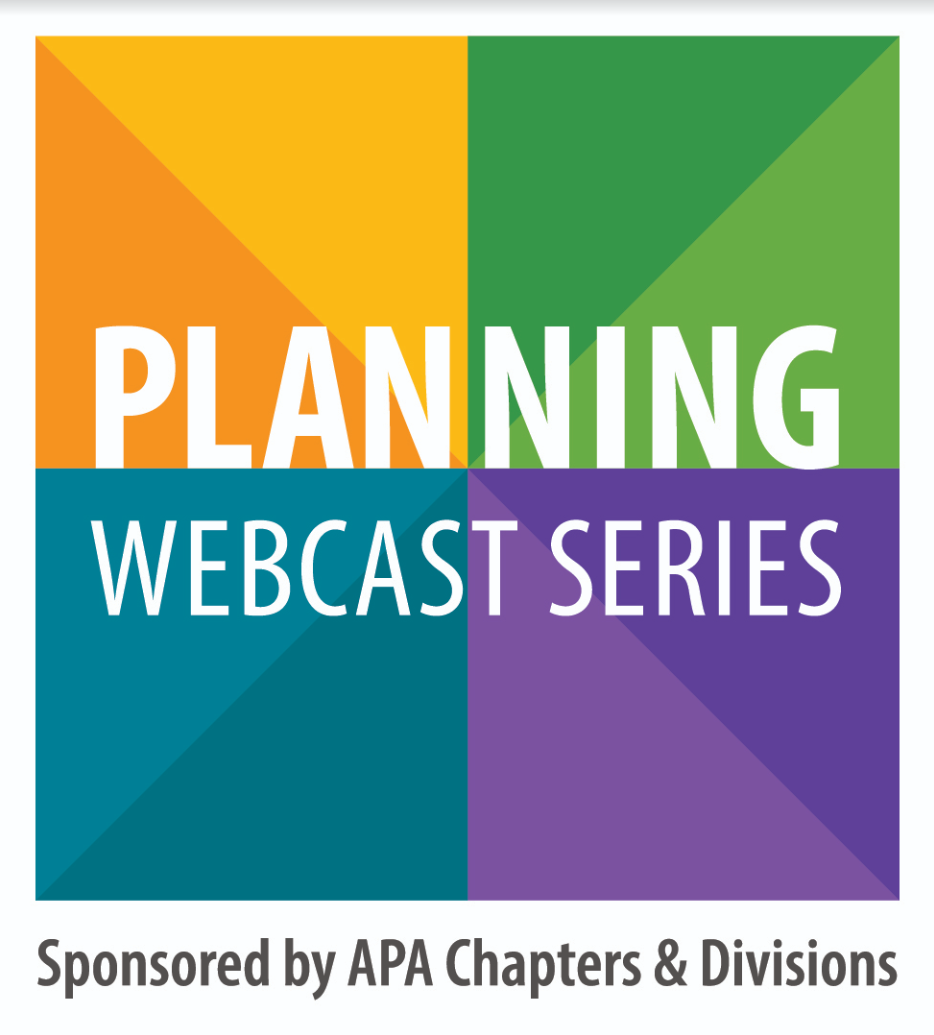HELLO
Earn over 50 AICP CM credits each year online - at no cost to members of participating organizations that support the Planning Webcast Series. Check back often as we frequently add additional offerings.
- Webcasts take place live on Fridays from 1:00 - 2:30 PM ET and are worth 1.5 AICP CM credits (for live viewing only) unless otherwise noted
- On-demand webcasts are available for your convenience in the 'On-Demand Webcasts' tab above
- Webcast recordings and slide decks are available in the 'Past Webcasts' tab below
- Please contact us for transcription assistance.
Connect With Us:
Upcoming Webcasts
Risk Management Guidelines & Recommendations for Private Sector Planners
February 13, 2026 | 1:00 - 2:30 PM ET
CM #9324198Guest Host: APA Private Practice Division x APA Planning and Law Division
The APA Private Practice and Planning Law Divisions are co-sponsoring this webinar on risk management guidelines and professional liability. The session presenters include two attorneys, an insurance agent, and a private sector planner. They will discuss risk management guidelines and liability issues for planners and other design professionals and how to obtain liability insurance.
CM 1.5
L 1
LEED v5 For Planning: What Planners Need to Know
March 1, 2026 | 1:00 - 2:00 PM ET *Thursday*
CM #TBAGuest Host: APA Sustainable Communities Division
This session introduces professionals to the LEED v5 framework through real-world planning and design examples aligned with its core priorities. By analyzing projects that predate or operate outside of LEED v5 certification, the session highlights how many of the framework’s key themes—such as decarbonization, resilience, equity, and human health—are already embedded in practice. Through case-based discussion, participants will build foundational LEED skills, learn how to identify and translate these principles into future projects, and better understand how the framework builds on existing approaches in the field. This session is designed as an introductory, skills-building opportunity for those new to LEED.
CM 1
SR 1
2025 Webcast Archive
Local and Global Perspectives on Extreme Urban Heat
January 16, 2026 | 1:00 - 2:30 PM ET
CM #9323129Guest Host: APA S&R Series
Extreme heat driven by climate change has become an increasingly urgent challenge for cities worldwide, and planners are uniquely positioned to lead efforts to strengthen heat resilience and adaptation. The APA Cross-Divisional Sustainability Working Group will present Local and Global Perspectives on Extreme Urban Heat featuring an open, facilitated discussion with a panel of experts who will share how planning policies, strategies, and tools are being used across communities and countries to address extreme heat. Participants will gain insight into current best practices for heat-resilient planning across different city types and learn from international and global perspectives that can inform local action.
CM 1.5
SR 1
Breaking Bread, Breaking Tradition: A Masterclass in Collaborative Planning
January 30, 2026 | 1:00 - 2:30 PM ET
CM #9323700Guest Host: APA Illinois
What happens when four planning firms ditch the pitch and come together? Real talk planners actually need—no competition, just collaboration. In this interactive session, four principals share hard-won lessons from the field, proving that collaboration and healthy competition can coexist to level up people and places. You’ll gain practical, ready-to-use insights on consultant-client alignment and visualization best practices; uncovering authentic community stories that humanize data and strengthen plans; and mobilizing partners, resources, and momentum to move from planning to implementation. Whether you’re a seasoned professional or a new planner, you’ll leave with actionable strategies, fresh perspectives, and renewed confidence in the power of collaborative planning.
CM 1.5
Sustainable Communities Division Annual Symposium
February 5, 2026 | 2:00 - 5:00 PM ET *Thursday*
CM #9323929Guest Host: APA Sustainable Communities Division
The 2026 APA Sustainable Communities Division’s annual virtual symposium will explore climate planning during a time of unprecedented uncertainty. The Symposium will explore how innovation at the intersection of planning frameworks, adaptive management, evaluation methods, and emerging technologies can strengthen climate planning in the face of uncertainty. It will also address practical challenges, such as advancing climate resilience efforts despite constrained resources, limited capacity, and resistant political environments.
CM 3
SR 1


